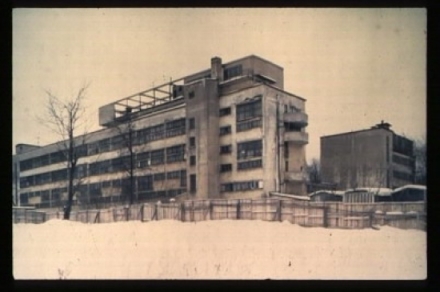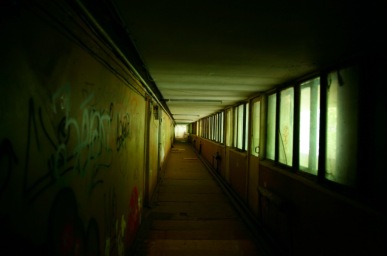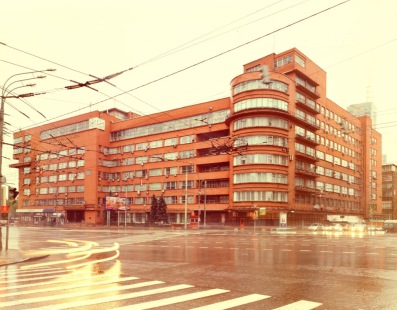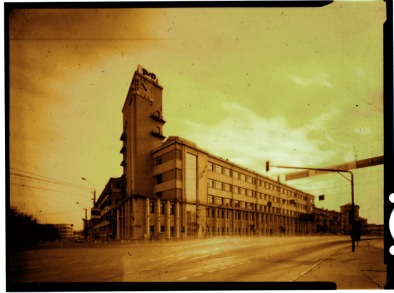
Sigizmund Krzhizhanovskii’s collected works
«ВоÑÐ¿Ð¾Ð¼Ð¸Ð½Ð°Ð½Ð¸Ñ Ð¾ будущем»
 Сигизмунд КржижановÑкий
 ВоÑÐ¿Ð¾Ð¼Ð¸Ð½Ð°Ð½Ð¸Ñ Ð¾ будущем.
 ПовеÑÑ‚ÑŒ
   I
   Любимой Ñказкой четырехлетнего МакÑи была Ñказка про Тика и Така. ОÑедлав отцовÑкое колено, ладонÑми в Ð²Ð¾Ñ€Ñ Ð¿Ñ€Ð¾Ð¿Ð°Ñ…Ð½ÑƒÐ²ÑˆÐµÐ³Ð¾ табаком пиджака, малыш командовал:
   – Про Така.
   Колено качалоÑÑŒ в такт маÑтнику, такающему Ñо Ñтены, и отец начинал:
   – Сказку Ñту раÑÑказывают так: жили-были чаÑÑ‹ (в чаÑах пружина), а у чаÑов два Ñына – Тик и Так. Чтобы научить Тика Ñ Ð¢Ð°ÐºÐ¾Ð¼ ходить, чаÑÑ‹, хоть и крÑÑ…Ñ‚Ñ, дали ÑÐµÐ±Ñ Ð·Ð°Ð²Ð¾Ð´Ð¸Ñ‚ÑŒ. И Ñ‡ÐµÑ€Ð½Ð°Ñ Ñтрелка – за оÑобую плату – гулÑла Ñ Ð¢Ð¸Ðº-Таком по циферблату. Ðо выроÑли Тик и Так: вÑе им не то, вÑе им не так. Ушли Ñ Ñ†Ð¸Ñ„Ñ€ и Ñ Ð±Ð»Ð°Ñ‚Ð° – назад не идут. РчаÑÑ‹ ищут Ñтрелами, крÑÑ…Ñ‚ÑÑ‚ и зовут: “Тик-Так, Так-Тик, ,Так!” Так раÑÑказано или не так?
   И маленький МакÑ, нырнув головой под полу пиджака, щурилÑÑ Ñквозь Ñуконные веки петлицы и неизменно отвечал:
   – Ðе так.
   Теплый отцовÑкий жилет дергалÑÑ Ð¾Ñ‚ Ñмеха, шурша об уши, Ñквозь прорезь петлицы видна была рука, вытрÑÑ…Ð¸Ð²Ð°ÑŽÑ‰Ð°Ñ Ñ‚Ñ€ÑƒÐ±ÐºÑƒ:
   – Ðу а как же? Я Ñлушаю ваÑ, гоÑподин ÐœÐ°ÐºÑ Ð¨Ñ‚ÐµÑ€ÐµÑ€.
   В конце концов, ÐœÐ°ÐºÑ Ð¨Ñ‚ÐµÑ€ÐµÑ€ ответил: но лишь тридцать лет ÑпуÑÑ‚Ñ.
Â Â Â ÐŸÐµÑ€Ð²Ð°Ñ Ð¿Ð¾Ð¿Ñ‹Ñ‚ÐºÐ° вышагнуть из Ñлов в дело отноÑитÑÑ Ðº шеÑтому году жизни МакÑа.
   Дом, в котором жила ÑÐµÐ¼ÑŒÑ Ð¨Ñ‚ÐµÑ€ÐµÑ€Ð¾Ð², примыкал к горчичным плантам, уходÑщим зелеными квадратами к далекому изгибу Волги. Однажды – Ñто было июльÑким вечером – мальчуган не ÑвилÑÑ Ðº ужину. Слуга обошел вкруг дома, Ð²Ñ‹ÐºÑ€Ð¸ÐºÐ¸Ð²Ð°Ñ Ð¿Ð¾ имени запропаÑтившегоÑÑ. Прибор МакÑа за вÑе Ð²Ñ€ÐµÐ¼Ñ ÑƒÐ¶Ð¸Ð½Ð° оÑтавалÑÑ Ð½ÐµÐ·Ð°Ð½Ñтым. Вечер перешел в ночь. Отец вмеÑте Ñо Ñлугой отправилиÑÑŒ на розыÑки. Ð’ÑÑŽ ночь в доме горел Ñвет. Только к утру беглец был отыÑкан: у .речной переправы, в деÑÑти верÑтах от дома. У него был вид заправÑкого путешеÑтвенника: за Ñпиной кошель, в руках палка, в кармане краюха хлеба и четыре пÑтака. Ðа гневные окрики отца, требовавшего чиÑтоÑердечного признаниÑ, беглец Ñпокойно отвечал:
   – Ðто не Ñ, а Так и Тик бежали. Ð Ñ Ñ…Ð¾Ð´Ð¸Ð» их иÑкать.
   Штерер-отец, дав и Ñебе и Ñыну отъеÑÑ‚ÑŒÑÑ Ð¸ отоÑпатьÑÑ, решил круто изменить Ñвою воÑпитательную методу. Призвав к Ñебе маленького МакÑа, он заÑвил, что Ñказки дурь и небыль, что Так и Тик попроÑту Ñтук одной железной планки о другую и что Ñтук никуда бегать не может. Ð’Ð¸Ð´Ñ Ð½ÐµÐ´Ð¾ÑƒÐ¼ÐµÐ½Ð¸Ðµ в голубых широко раÑкрытых глазах мальчугана, он открыл ÑтеклÑнную дверцу Ñтенных чаÑов, ÑнÑл Ñтрелки, затем циферблат и, Ð²Ð¾Ð´Ñ Ð¿Ð°Ð»ÑŒÑ†ÐµÐ¼ по зубчатым контурам механизма, объÑÑнил: гири, оттого что они Ñ‚Ñжелые, Ñ‚Ñнут зубьÑ, Ð·ÑƒÐ±ÑŒÑ Ð·Ð° зубцы, а зубцы за зубчики – и вÑе Ñто Ð´Ð»Ñ Ñ‚Ð¾Ð³Ð¾, чтобы мерить времÑ.
   Слово “времє понравилоÑÑŒ МакÑу. И когда – два-три меÑÑца ÑпуÑÑ‚Ñ – его заÑадили за букварь, в, е, м, Ñ€, Ñ Ð±Ñ‹Ð»Ð¸ первыми знаками, из которых он попробовал поÑтроить, Ð²Ð¾Ð´Ñ Ð¿ÐµÑ€Ð¾Ð¼ по коÑым линейкам, Ñлово.
   Узнав дорогу к шевелÑщимÑÑ ÐºÐ¾Ð»ÐµÑикам, мальчик решил повторить опыт, проделанный отцом. Однажды, выждав, когда в доме никого не было, он приÑтавил к Ñтене табурет, взобралÑÑ Ð½Ð° него и открыл чаÑовую дверцу. У Ñамых глаз его мерно раÑкачивалÑÑ Ð¶ÐµÐ»Ñ‚Ñ‹Ð¹ диÑк маÑтника; цепь, натÑÐ½ÑƒÑ‚Ð°Ñ Ð³Ð¸Ñ€ÐµÑŽ, уходила вверх в темноту и шуршание зубцов. Затем Ñ Ñ‡Ð°Ñами Ñтало проиÑходить Ñтранное: когда ÑадилиÑÑŒ обедать, Штерер-Ñтарший, глÑнув на циферблат, увидел: две минуты третьего. “Поздновато”,- пробурчал он и поÑпешно взÑлÑÑ Ð·Ð° ложку. Ðа новый взглÑд, в промежутке между первым и вторым, чаÑÑ‹ ответили: две минуты пÑтого. “Что за цум тайфель?44 Ðеужели мы ели Ñуп два чаÑа?” Штерер-младший молчал, не Ð¿Ð¾Ð´Ñ‹Ð¼Ð°Ñ Ð³Ð»Ð°Ð·; когда вÑтавали из-за Ñтола, Ñтрелки доÑтигли пÑти минут воÑьмого, а пока Ñлуга уÑпел Ñбегать за чаÑовым маÑтером, жившим поблизоÑти, чаÑÑ‹ заÑвили о близоÑти полночи, Ñ…Ð¾Ñ‚Ñ Ð·Ð° окном ÑиÑло Ñолнце.
   МаÑтер, ÑвившиÑÑŒ на зов, прежде вÑего ÑнÑл Ñтрелки и, протÑнув их маленькому МакÑу, попроÑил подержать. Пока он, обнажив механизм, вмеÑте Ñ Ñ…Ð¾Ð·Ñином оÑматривал винты и колеÑики, у напроказившего мальчугана было доÑтаточно времени, чтобы Ñдернуть крохотный протез на ниточке Ñ ÐºÐ¾Ñ€Ð¾Ñ‚ÐºÐ¾Ñ€ÑƒÐºÐ¾Ð¹ чаÑовой Ñтрелы. Тщательно вÑе оÑмотрев и выверив, маÑтер заÑвил, что чаÑÑ‹ в полной иÑправноÑти и что незачем было его, человека занÑтого, напраÑно беÑпокоить.
   Выведенный из ÑÐµÐ±Ñ Ð¨Ñ‚ÐµÑ€ÐµÑ€-Ñтарший закричал, что Ñвоим глазам он верит больше, чем чужим знаниÑм, и потребовал починить взбеÑившиеÑÑ Ñ‡Ð°ÑÑ‹. МаÑтер, обидевшиÑÑŒ в Ñвою очередь, заÑвил, что еÑли кто и взбеÑилÑÑ, то во вÑÑком Ñлучае не чаÑÑ‹, и что он не намерен тратить Ð²Ñ€ÐµÐ¼Ñ Ð¸ брать деньги за починку неиÑпорченного. И, поÑтавив Ñтрелы на меÑто, хлопнул Ñначала чаÑовой дверцей, затем дверью. И чаÑÑ‹, точно Ð´Ð¾Ð²ÐµÑ€ÑˆÐ°Ñ Ð¸Ð·Ð´ÐµÐ²Ð°Ñ‚ÐµÐ»ÑŒÑтво над Ñвоим хозÑином, вдруг круто изменив ход, Ñтали отÑтукивать минуты Ñ Ñ…Ñ€Ð¾Ð½Ð¾Ð¼ÐµÑ‚Ñ€Ð¸Ñ‡ÐµÑкой точноÑтью.
   ВеÑÑŒ оÑтаток Ð´Ð½Ñ Ð¾Ñ‚ÐµÑ† и Ñын провели, не обмолвившиÑÑŒ ни Ñловом. Изредка то тот, то Ñтот Ñ Ð±ÐµÑпокойÑтвом поглÑдывали на циферблат. За окном уже чернела нрчь, когда МакÑ, Ð¿Ñ€ÐµÐ¾Ð´Ð¾Ð»ÐµÐ²Ð°Ñ Ñмущение, подошел к отцу и, притронувшиÑÑŒ к его колену, Ñказал:
   – Про Така.
   И легенда о Тике и ТакÑ, Ð¸Ð·Ð³Ð½Ð°Ð½Ð½Ð°Ñ Ð±Ñ‹Ð»Ð¾ из штерерÑкого дома, возвратилаÑÑŒ воÑвоÑÑи. Штерер-младший, Ð¿Ñ€Ð¾Ð¸Ð·Ð²Ð¾Ð´Ñ Ñвой первый опыт, заÑтавил чаÑовые Ñтрелки поменÑÑ‚ÑŒÑÑ Ð¾ÑÑми: минутную на чаÑовую – чаÑовую на минутную. И он мог убедитьÑÑ, что даже Ñ‚Ð°ÐºÐ°Ñ Ð¿Ñ€Ð¾ÑÑ‚Ð°Ñ Ð¿ÐµÑ€ÐµÑтановка нарушает ход пÑихичеÑких механизмов.
   ВытÑнув руку, ÑкÑпериментатор потрогал одну из Ñтрел – ту, что покороче. Ð”Ñ€ÑƒÐ³Ð°Ñ ÑƒÐ²Ð¾Ð´Ð¸Ð»Ð° Ñвое длинное черное оÑтрие вверх. Ðеобходимо было обÑледовать и ее. ПривÑтав на цыпочки, он дотÑнулÑÑ. Ðад головой что-то хруÑтнуло, а в пальцах у него чернел отломавшийÑÑ ÐºÐ¾Ð½Ñ‡Ð¸Ðº Ñтрелы. Как быть? Из шва курточки топорщилаÑÑŒ Ñ‡ÐµÑ€Ð½Ð°Ñ Ð½Ð¸Ñ‚ÐºÐ°. Через минуту отломавшийÑÑ ÐºÐ¾Ð½Ñ‡Ð¸Ðº был аккуратно привÑзан к ближайшему оÑтрию. Правда, ÐºÐ¾Ñ€Ð¾Ñ‚ÐºÐ°Ñ Ñтрелка от Ñтого Ñтала длинной, а Ð´Ð»Ð¸Ð½Ð½Ð°Ñ ÐºÐ¾Ñ€Ð¾Ñ‚ÐºÐ¾Ð¹,- но не вÑе ли равно. Ð’ Ñто Ð²Ñ€ÐµÐ¼Ñ Ð¿Ð¾ коридору шаги. Мальчуган захлопнул дверцы чаÑов, Ñпрыгнул и оттащил табурет на меÑто.
   Старые терпеливые цюрихÑкие чаÑÑ‹ не раÑÑердилиÑÑŒ на любознательного мальчугана, повредившего им их черный палец. БезуÑтанно ÑˆÐ°Ð³Ð°Ñ Ð¸Ð· угла в угол на Ñвоей длинной ноге внутри Ñвоей тюремно-теÑной ÑтеклÑнной клетки, они ÑниÑходительно разрешали паре детÑких глаз поÑещать ÑÐµÐ±Ñ Ð² Ñвоем наÑтенном одиночеÑтве. Размеренно Ð¾Ñ‚Ñ‡ÐµÐºÐ°Ð½Ð¸Ð²Ð°Ñ Ñекунды, механичеÑкий учитель из Цюриха, как и большинÑтво учителей, был напружен, точен и методичен. Ðо гений и не нуждаетÑÑ Ð² том, чтобы его учили фантазии; ÑÑ‚Ñ€Ð°Ð´Ð°Ñ Ð¾Ñ‚ Ñвоей чрезмерноÑти, он ищет у людей лишь одного – меры. Таким образом преподаватель и ученик вполне подходили друг к другу. Ð’ÑÑкий раз, когда за Ñтеной захрапит поÑлеобеденным храпом отец, Штерер-младший, придвинув табурет к проблеме времени, начинал Ñвои раÑÑпроÑÑ‹. Он Ñ‚Ñнул ÑƒÑ‡Ð¸Ñ‚ÐµÐ»Ñ Ð·Ð° гири, ощупывал ему его круглое белое лицо, пробиралÑÑ Ð¿Ñ‹Ñ‚Ð»Ð¸Ð²Ñ‹Ð¼Ð¸ пальчиками внутрь его жеÑткого и колючего мозга. И однажды ÑлучилоÑÑŒ так, что механичеÑкий учитель – очевидно, озадаченный каким-то трудным вопроÑом вдруг ÑвеÑил ногу и переÑтал отчеканивать урок. МакÑ, полагаÑ, что чаÑÑ‹ обдумывают ответ, терпеливо дожидалÑÑ, ÑÑ‚Ð¾Ñ Ð½Ð° табурете. Молчание длиннилоÑÑŒ. Стрелы заÑтыли на белом диÑке. Из-за зубцов – ни звука и ни призвука. ИÑпуганный ребенок, Ñпрыгнув наземь, броÑилÑÑ Ðº ÑпÑщему отцу; Ñ‚ÐµÑ€ÐµÐ±Ñ ÐµÐ³Ð¾ за ÑвеÑившийÑÑ Ñ€ÑƒÐºÐ°Ð², он, Ñквозь вÑхлипы, бормотал:
   – Папа, чаÑÑ‹ умерли. Ðо Ñ Ð½Ðµ виноват.
   Отец, ÑÑ‚Ñ€Ñхнув Ñ ÑÐµÐ±Ñ Ð¿Ñ€Ð¾Ñонье, зевнул и Ñказал:
   – Что за вздор. Умереть – Ñто не так проÑто, уÑпокойÑÑ, мальчик: они иÑпортилиÑÑŒ. Только и вÑего, и мы их починим. Рплачут только девочки.
   Тогда будущий маÑтер длительноÑтей, вытерев кулачками глаза, ÑпроÑил:
   – РеÑли иÑпортитÑÑ Ð²Ñ€ÐµÐ¼Ñ – мы его тоже починим?
   Отцу, ÑÐ»ÐµÐ´ÑƒÑ Ð¿Ñ€Ð¸Ð¼ÐµÑ€Ñƒ Ñтарых чаÑов, пришлоÑÑŒ замолчать. РаÑпрÑмившиÑÑŒ, он Ñ Ð½ÐµÐºÐ¾Ñ‚Ð¾Ñ€Ñ‹Ð¼ беÑпокойÑтвом оглÑдывал Ñвое порождение. Continue reading →
![]() .
.![]() .
.









